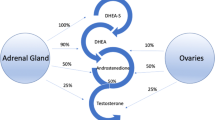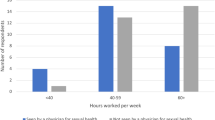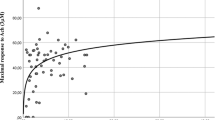Abstract
Androgen deficiency syndrome is a commonly diagnosed condition. The aim of this study was to investigate common clinical practices of specialists in the field of sexual medicine regarding androgen replacement treatment for men and women. Attendees of the 16th Annual Congress of the European Society of Sexual Medicine held in January 2014 in Istanbul, Turkey, were asked to participate in a survey during the congress days. A 24-item self-report, closed-question questionnaire was distributed. Three sections were accessed: sociodemographic data, professional background and personal practice patterns regarding androgen substitution in men and women. A total of 133 physicians (mean age 47 years; range 25–79) completed the survey. Responses were inconsistent regarding the lab tests used for primary evaluation of male androgen deficiency. The majority of participants (62%) recommended testosterone replacement therapy for symptomatic men with testosterone levels <8 nmol l−1 (231 ng dl−1). Similarly, most physicians (88%) recognized a correlation between libido and testosterone levels in women. Only 42% and 53% reported they would prescribe testosterone to women with low libido, premenopausal and postmenopausal, respectively. This survey showed discrepancies among physicians regarding testosterone replacement therapy for men and women.
This is a preview of subscription content, access via your institution
Access options
Subscribe to this journal
Receive 8 print issues and online access
$259.00 per year
only $32.38 per issue
Buy this article
- Purchase on Springer Link
- Instant access to full article PDF
Prices may be subject to local taxes which are calculated during checkout
Similar content being viewed by others
References
Giannoulis MG, Martin FC, Nair KS, Umpleby AM, Sonksen P . Hormone replacement therapy and physical function in healthy older men. Time to talk hormones? Endocr Rev 33: 314–377.
Shi Z, Araujo AB, Martin S, O'Loughlin P, Wittert GA . Longitudinal changes in testosterone over five years in community-dwelling men. J Clin Endocrinol Metab 2013; 98: 3289–3297.
Chin KY, Ima-Nirwana S, Mohamed IN, Aminuddin A, Ngah WZ . Total testosterone and sex hormone-binding globulin are significantly associated with metabolic syndrome in middle-aged and elderly men. Exp Clin Endocrinol Diabetes 2013; 121: 407–412.
Wu FC, Tajar A, Pye SR, Silman AJ, Finn JD, O'Neill TW et al. Hypothalamic-pituitary-testicular axis disruptions in older men are differentially linked to age and modifiable risk factors: the European Male Aging Study. J Clin Endocrinol Metab 2008; 93: 2737–2745.
Corona G, Mannucci E, Forti G, Maggi M . Hypogonadism, ED, metabolic syndrome and obesity: a pathological link supporting cardiovascular diseases. Int J Androl 2009; 32: 587–598.
Mulligan T, Frick MF, Zuraw QC, Stemhagen A, McWhirter C . Prevalence of hypogonadism in males aged at least 45 years: the HIM study. Int J Clin Pract 2006; 60: 762–769.
Araujo AB, Esche GR, Kupelian V, O'Donnell AB, Travison TG, Williams RE et al. Prevalence of symptomatic androgen deficiency in men. J Clin Endocrinol Metab 2007; 92: 4241–4247.
Harman SM, Metter EJ, Tobin JD, Pearson J, Blackman MR . Longitudinal effects of aging on serum total and free testosterone levels in healthy men. Baltimore Longitudinal Study of Aging. J Clin Endocrinol Metab 2001; 86: 724–731.
Bachmann G, Bancroft J, Braunstein G, Burger H, Davis S, Dennerstein L et al. Female androgen insufficiency: the Princeton consensus statement on definition, classification, and assessment. Fertil Steril 2002; 77: 660–665.
West SL, D'Aloisio AA, Agans RP, Kalsbeek WD, Borisov NN, Thorp JM . Prevalence of low sexual desire and hypoactive sexual desire disorder in a nationally representative sample of US women. Arch Intern Med 2008; 168: 1441–1449.
Sarrel PM . Sexuality and menopause. Obstet Gynecol 1990; 75: 26S–30S; discussion 31S–35S.
Handelsman DJ . Global trends in testosterone prescribing, 2000–2011: expanding the spectrum of prescription drug misuse. Med J Aust 199: 548–551.
Behre HM, Christin-Maitre S, Morales AM, Tostain J . Transversal European survey on testosterone deficiency diagnosis. Aging Male 15: 69–77.
Shortridge EF, Polzer P, Donga P, Blanchette CM, Fang Y, Burudpakdee C et al. Experiences and treatment patterns of hypogonadal men in a U.S. health system. Int J Clin Pract 68: 1257–1263.
Ullah MI, Riche DM, Koch CA . Transdermal testosterone replacement therapy in men. Drug Des Devel Ther 8: 101–112.
Szeinbach SL, Seoane-Vazquez E, Summers KH . Development of a men's Preference for Testosterone Replacement Therapy (P-TRT) instrument. Patient Prefer Adherence 6: 631–641.
Davison SL, Bell R, Donath S, Montalto JG, Davis SR . Androgen levels in adult females: changes with age, menopause, and oophorectomy. J Clin Endocrinol Metab 2005; 90: 3847–3853.
Shifren JL, Davis SR, Moreau M, Waldbaum A, Bouchard C, DeRogatis L et al. Testosterone patch for the treatment of hypoactive sexual desire disorder in naturally menopausal women: results from the INTIMATE NM1 Study. Menopause 2006; 13: 770–779.
Wierman ME, Arlt W, Basson R, Davis SR, Miller KK, Murad MH et al. Androgen therapy in women: a reappraisal: an endocrine society clinical practice guideline. J Clin Endocrinol Metab 99: 3489–3510.
Tostain J, Coeuret C . French urologist's opinion on testosterone deficiency syndrome: Afu's andrology committee survey. Prog Urol 2008; 18: 601–607.
Author information
Authors and Affiliations
Corresponding author
Ethics declarations
Competing interests
The authors declare no conflict of interest.
Appendix 1. The Questionnaire
Appendix 1. The Questionnaire
Section 1
Demographic data:
Please specify your
Age: _________ years
Gender: □Male □Female
Country of origin: _________
Country of practice: _________
Section 2
Professional background:
1. Please specify your occupation:
Physician 1□
Psychologist 2□
Sexual therapist 3□
Physical therapist 4□
Nurse (RN) 5□
Preclinical researcher 6□
Other, please specify _________
2. If you are a physician, please specify your specialty
Urologist 1□
Gynaecologist 2□
Psychiatrist 3□
Endocrinologist 4□
Cardiologist 5
General practitioner 6□
Other, please specify _________
3. For how long have you been practicing sexual medicine?
1□Less than 5 years 2□Between 5 and 10 years 3□More than 10 years
4. Do you practice in a private clinic or in the public health care system?
Academic hospital 1□
Private clinic/private practice 2□
Public health care system 3□
Both private and public health care system 4□
Other, please specify _________
Section 3
Male:
1. How often do you encounter men with suspected hypogonadism?
□Frequently
□Occasionally
□Almost never
□Never
2. For which indications do you order testing for serum testosterone levels in males?
All males with erectile dysfunction 1□
Only males with symptoms of androgen deficiency 2□
All males with metabolic syndrome (hypertension, diabetes, overweight and hyperlipidaemia) 3□
All males above the age of 50 years 4□
3. Which lab test do you order for primary evaluation of hypogonadism?
Free testosterone 1□
Free androgen index 2□
Total testosterone 3□
All the above 4□
4. What is the cutoff level of total testosterone under which you recommend androgen replacement treatment in symptomatic men?
8 nmol ml−1 1□
10 nmol ml−1 2□
12 nmol ml−1 3□
5. Do you prescribe androgen replacement treatment for symptomatic patients with total testosterone level above 12 nmol\ml
Yes, no need for further evaluation 1□
Yes, if free testosterone level is low 2□
No 3□
6. What is your drug of choice for treating androgen deficiency?
Short acting, Testosterone Enanthate injection 1□
Long acting, Undecanoate Testosterone injection 2□
Transdermal androgen preparate 3□
7. In your opinion, does treatment with androgen replacement in hypogonadal males result in an increased risk of prostate cancer?
Yes 1□
No 2□
Female:
8. In your opinion, is there a correlation between libido and testosterone level in women?
Yes 1□
No 2□
9. In your opinion, does testosterone prescription for women affect their libido?
Yes 1□
No 2□
10. Would you prescribe testosterone to pre menopausal women with low libido?
Yes 1□
No 2□
11. Would you prescribe testosterone to menopausal women with low libido?
Yes 1□
No 2□
12. In your opinion, which of the following sexual function domains in women are affected by a low level of androgen?
Libido 1□
Lubrication 2□
Sexual arousal 3□
Orgasm 4□
13. Do you test for serum testosterone level in women with sexual disorder?
Yes 1□
No 2□
14. How do you treat, if at all, postmenopausal women with low libido?
Transdermal testosterone gel 1□
Testosterone injection 2□
Tibolone tablets 3□
15. How do you prescribe testosterone to women?
Continuous treatment 1□
On demand before intercourse 2□
I don't prescribe 3□
Rights and permissions
About this article
Cite this article
Lowenstein, L., Shechter, A., Porst, H. et al. Physicians' attitudes towards androgen replacement therapy for male and female sexual dysfunction. Int J Impot Res 28, 57–61 (2016). https://doi.org/10.1038/ijir.2016.2
Received:
Revised:
Accepted:
Published:
Issue Date:
DOI: https://doi.org/10.1038/ijir.2016.2



